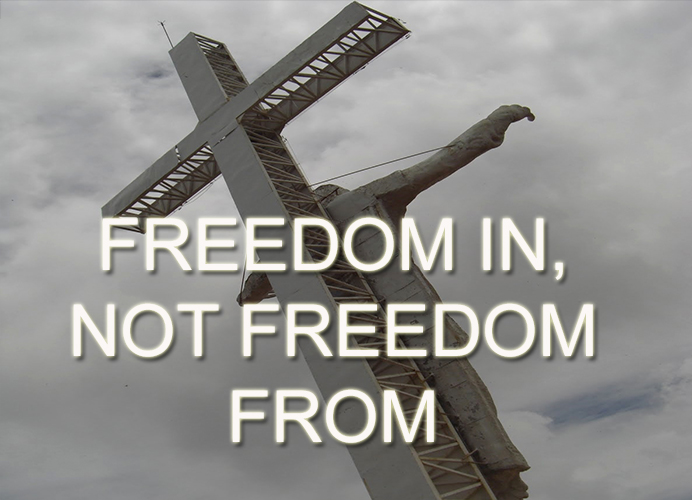FREEDOM IN, NOT FREEDOM FROM

Written by Jessica Ponder on January 31, 2016
How I Found ‘Freedom In, Not Freedom From’
It’s rare that you read poignant words on Facebook. My friend Lauren penned this in a status update: “Why is freedom so easily associated with ‘freedom from’ everything? To be truly free is ‘freedom in’.” That was three years ago, and I’m still thinking about that phrase freedom in, not freedom from.
Her words ring true, because our culture truly does celebrate “freedom from” virtually everything: We want freedom from authority and accountability, as our deep suspicion and distrust of people in power shows. We want freedom from work and responsibility, so we idolize rest, complain about our jobs, and ‘live for the weekend.’ We increasingly want freedom from the constraints of Christian community (that actually exist for our good)—which is why many are leaving the church in droves. The rise of deliberate childlessness among married couples, the reality of absentee dads, and the tragedy of broken families further show that we want freedom from consequences and freedom from commitment. In all these we look for an escape from things instead of seeking joy in things.
Looking for an Escape
And this is not an abstract problem for other people “out there.” Our own hearts constantly look for an escape: Our social media activity, our complaints to friends, and our internal dialogue reveal that our hearts naturally seek “freedom from” responsibility rather than “freedom in” what God has given us.
“If I could just get away from my job for a few weeks, everything would be OK.”
“If I could just get one night of sleep alone away from my kids or spouse, I could be more patient with them.”
“If I could just have more ‘me time,’ then I would be OK.”
“If I could just get out of this city or this neighborhood… this house… this school… this situation… then I would be free to live a different life.”
“If I could have married a different person, then I wouldn’t be so unhappy.”
“If I could just have a little more money like _____, then I’d be more joyful.”
“If I could just go back to work for a little while, I’d feel like a woman instead of a mom.”
“If I could just be my own boss, then I wouldn’t hate my job.”
“If I could just hire a maid to clean my house…”
“If I could just stop having to pay bills…”
“If I could just be able to do whatever I want…”
“If I could run away from it all…”
This escapist “freedom from” and “grass is greener” mentality shows that we typically blame our situation and think that “freedom from” our circumstances is the solution to our problems and the path to a happy life. Of course, there certainly are challenging circumstances in life, and there is nothing wrong with seeking to be proactive about such things. However, when we spend all of our time longing for a different situation, or when we are discontent and bitter in the midst of these circumstances, then we all know there’s something sinister at work in our hearts.
But this restlessness in our hearts can never be cured by fewer children, a different job, a different spouse, fewer bills, endless luxury or even a fresh start. Contentment and joy cannot be found in a life of escape. The “freedom from” route never brings what it seems to promise, and the reason is because what we are running from, in most cases, is actually part of God’s good design.
The Goodness of God’s Design
When you consider how God created the world, it’s clear that he invites us to a life of “freedom in” the callings and responsibilities he has given us, not “freedom from” them. When God placed us in the Garden of Eden, he placed us under his authority and his blessing, gave us work, gave us family, and gave us community. He also gave us a mission, and he said all this was “very good” (Gen. 1:31). Before Adam and Eve sinned, they experienced freedom in all of these things. God’s purpose and design for us was (and is) beautiful and good.
In a way, the very first of humanity’s many sins was seeking freedom from God’s design for life instead of finding freedom in living with the grain of creation. Adam and Eve sought freedom from God’s authority and tried to establish their own. They wanted freedom from God’s command, while (ironically) they were already free in every other respect! The rest of the Bible is filled with similar examples of people making selfish and destructive choices based in a desire to find freedom from the design and purposes of God.
Our sin hasn’t changed God’s design—what God calls good is still good—but sin has changed our ability to experience the goodness of what God’s creation and his callings in our lives. Left to ourselves, we would never find joy in this life no matter how much “freedom from” we might accrue.
But we haven’t been left to ourselves.
Jesus Came to Bring True Freedom
Jesus came to give us freedom in God’s design, not freedom from it. When Jesus said that he came to set the captives free (Luke 4:18), he was speaking about our slavery to sin (Rom. 6:20-22). In other words, he came to free us from wanting “freedom from” God’s wise design and his good purposes. We have been set free from sin that we might now be free to obey God from the heart (Rom. 6:17).
After all, the “abundant life” we shared with God before our fall into sin was a life filled with responsibility for the world, care for family members, involvement in community, and yes, even work! Jesus did not come to abolish these things, but to restore our joy in the midst of them all (John 15:11). And Jesus does so not by changing our circumstances, but by changing us. He gives us a new heart, new desires, and new perseverance through the Holy Spirit (Phil. 2:12-13).
As we trust Jesus, we begin to find joy in God’s wise design and beautiful plan for the world. We come to see that we have been given certain callings and commands both for God’s glory and for our good (Deut. 6:24). We do not experience joy in spite of such responsibilities, but through them. Jesus brings freedom in work, freedom in submission, freedom in lifelong marriage, freedom in parenthood during the toddler years and the teenage years, freedom in challenging work, freedom in community, and freedom in sacrifice. In all this Jesus leads us to find “freedom in” the goodness of God’s design, not freedom from it.
Jessica Ponder is a wife and mother to two (so far). She loves reading, singing, baking, and urban walking. In her dreams she is a piano player with time to practice, a gardener whose plants don’t die, and someone who could hang out with the entire world at the same time, all the time. Follow her on Twitter @MrsJessPonder.






